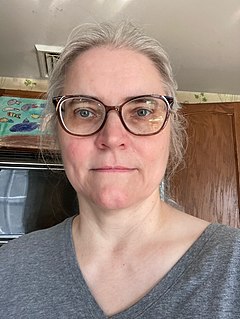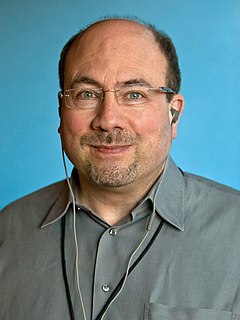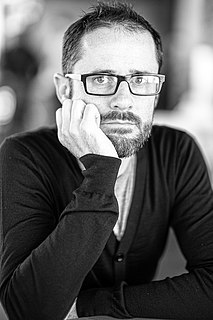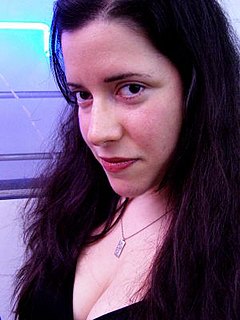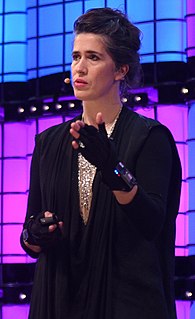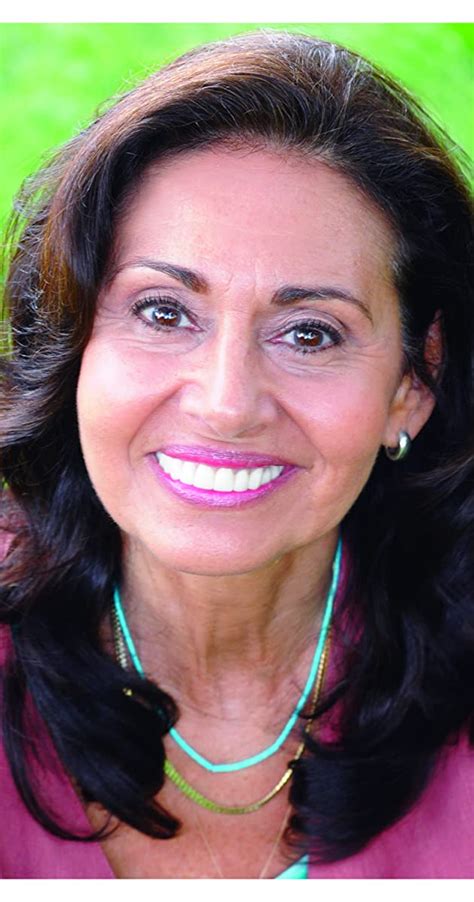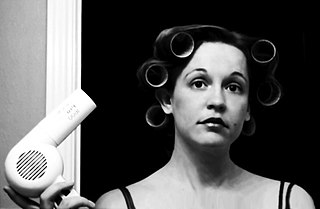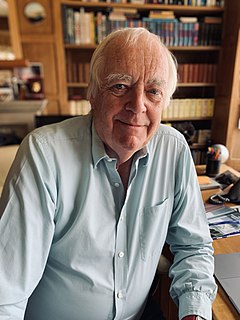Top 168 Blogging Quotes & Sayings - Page 3
Explore popular Blogging quotes.
Last updated on April 16, 2025.
Blogging has mostly been an opportunity to react more immediately to experiences to try out ideas that I may end up using in the print media or in some other place. When I write books, it's a way for me to bring readers into the experience of writing the book, all through the process of writing the books that I write. I talk about what I'm up to in the blog. I let people know what I am doing. To me, it's just part of putting my professional life up in a way that people who are interested in it can access; and learning things from them as well.
My book review site and first blog, which I started in 2003. I started it because I was lamenting that while I read so much, I could hardly remember any of it. People would ask me what good books I'd read recently, or what I thought of a particular book, and my mind would go blank. At the same time, I'd just heard of blogging and found the idea interesting and thought I'd give it a try.
The Internet, really. It's amazing what you can find. There are so many different resources on the Internet and I got into blogging because of my friend's sister who had a blog, Fashion Robot, which she stopped a few months ago just because it was too much time ... I started taking more of an interest in fashion, and going to more websites like Style.com or whatever. Eventually I made a hasty decision and made my own.
The place resembled a new model prison, or one that had achieved a provisional utopia after principled revolt, or maybe a homeless shelter for people with liberal arts degrees. The cages brought to mind those labs with their death-fuming vents near my college studio. These kids were part of some great experiment. It was maybe the same one in which I'd once been a subject. Unlike me, though, or the guinea pigs and hares, they were happy, or seemed happy, or were blogging about how they seemed happy.
In a faraway land called 'pre-2000,' what Earthlings now call blogging was called 'keeping a diary.' It's hard work to do well. I tried doing it in the early 1990s but had to stop because I no longer had a life - instead I had this thing that generated anecdotes to go into my diary. The diary took over and I had to stop.
I started blogging because I didn't know if I wanted to be an artist. I wanted to talk to other people online who were doing art, so I would post work and ask for feedback. I loved that an artist like James Jean would show his process on his blog. It became this open dialogue that, unfortunately, we don't have a lot in the fine-art world. People will say, "Wow, you share a lot." I'm like, "No, I make it a point to." Instagram is a great place for people to share failure. I don't want people to think that being an artist is some glamorous life.
My fear is you have to be careful as a writer to not get caught up in social media and blogging, because it can start to feed into your writing time. When you are writing a book, it's such a long journey where the payoff is way at the end, sometimes years away. The payoff of the blog post is today. You get the reinforcement, comments or "likes" immediately. It's appealing. You have to be patient with the book.
The most depressing thing about blogging is watching so-called 'citizen journalists' turn in to little more than easily offended partisan hacks. Any remark that is slightly less than completely and totally scripted and can give the slightest opportunity to offend some delicate soul somewhere is used to set off a series of partisan screeches and cries of outrage that would make the Church Lady jealous.
The book [ One Thousand Gifts] took just over a year to write, on the fringe hours, early and late, around home educating 6 kids and farming and blogging. And I wonder if the greatest challenges was to keep pressing into it when I had never been here before. I felt like Abraham - being called to something that he didn't know how to get to.
The goal in blogging/ business/ inspiring non-fiction is to share a truth, or at least a truth as the writer sees it. To not just share it, but to spread it and to cause change to happen. You can do that in at least three ways: with research (your own or reporting on others), by building and describing conceptual structures, or with stories that resonate.
I think blogging and the ability to instantaneously respond to news items has changed the way we approach all media. We're seeing people talking back to columnists, and going much further in the sexual realm than most papers, even alternative weeklies, will publish. I'm surprised more papers aren't having people do what you're doing with an online only column, and to be honest, I read almost all the media I do read online, and plenty of other people do, too, so I don't know what's stopping them.
The only thing I might have noticed [and this is pretty anecdotal] is that there is some tendency to need to be taught that 'writing is rewriting' - maybe more of a sense than was pervasive 10 years ago that the first or second pass of a story is sufficient. That is an idea that is easily dislodged, but I suspect it might have something to do with the turnaround time re: blogging and so on - this sense that there is some essential truth about a first draft that one runs the risk of "ruining" by coming back to it.
A foolhardy lot, we accepted it all, as we always do, never asked: "What is going to happen to us now, with this invention of print?" In the same way, we never thought to ask, "How will our lives, our way of thinking, be changed by the internet, which has seduced a whole generation with its inanities so that even quite reasonable people will confess that, once they are hooked, it is hard to cut free, and they may find a whole day has passed in blogging etc?"
And I thought, eight years ago, when I began carefully charting the progress of American Gods, nervously dipping my toes into the waters of blogging, would I have imagined a future in which, instead of recording the vicissitudes of bringing a book into the world, I would be writing about not-even-interestingly missing cups of cold camomile tea? And I thought, yup. Sounds about right. Happy Eighth birthday, blog.
You know, you'd hide behind a Public Enemy or Ice Cube, or Bruce Springsteen, or U2, because they spoke for you. But now everybody's bloggin'. I heard somebody say, "Blogging is just graffiti with punctuation." Everyone's an authority so there's nobody in power, 'cause everyone thinks they're in power.
I got the bad press and the blogging and the email threats because people really didn't understand. They thought I was anti-gay. That's not true at all. My spiritual mom has a gay son. Even he was telling his friends "No, that's not true. She's so accepting of me." That doesn't mean I accept his lifestyle. It means I accept him as a human person and as a creation of God and a person of value.
The Internet and blogging made writing somewhat more solitary and more splintered. It removes the whole sense of the magazine as an organism. A certain dynamism. At The Village Voice, there were all these fevers inside the offices, that would break out into full-scale rumbles between writers. The New Yorker used to be notorious for everything that went on, sexual intrigues and people had individual offices, they could close the door and take a bottle out of their bottom drawer or have sex on their desk.
I think that blogging and the Internet has completely changed feminism for ever, I think. You know, it used to be, 10 years ago, if you wanted to have a strong, influential voice in the feminist movement, you really needed to be part of this New York/D.C. elite group of feminists, or part of a mainstream feminist organization. And now it's kind of an amazing thing that you can just start a blog and put your voice out there and build your readership.
I was having problems with depression and anxiety disorder, and it felt like not blogging about it was creating a false history. When I did finally share the problems I was having, I was shocked - not only by the support that was given to me, but also by the incredible amount of people who admitted they struggled with the same thing.
Since the advent of the Internet - more recently compounded by blogging - everyone can be a published voice. Any cowardly, anonymous anger-monger can have an audience of thousands. That doesn't make them a journalist any more than my throwing an onion and a few carrots into a pot of boiling water makes me Julia Child.
I am sure if you went back to the days of 'My Fair Lady,' they would have had one public dress rehearsal, and that is it. And in a way, I would like to go back to that. Now you have people tweeting and blogging immediately, so you may as well regard your first preview as your opening night because you are going to get reviews.
I started designing book jackets, which was great because I was good at it. And then from there I decided to become a freelance graphic designer and I needed to expand beyond book jackets, so I taught myself web design, and then in 1999 some friends of mine decided to start a company called Xanga.com, which was a very early kind of social network slash blogging community.

